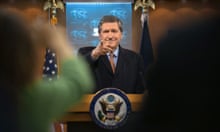On 16 September 1995, the fate of Banja Luka hung in the balance, and with it, the future of Bosnia-Herzegovina. For three years, the Bosnian Serbs waged a one-sided war on the country's Muslims and Croats, but now were on the verge of collapse. Abetted by Nato airstrikes, a resurgent Croatian army was on the outskirts of the Bosnian Serbs' only large city.
Washington gave Richard Holbrooke, President Clinton's special envoy for Bosnia, instructions to tell the Croatians to halt their offensive. Holbrooke flew on 16 September into the Croatian capital in advance of a meeting the next day with Croatia's authoritarian president, Franjo Tudjman. Holbrooke had doubts about the wisdom of his instructions, and so did I. A Serb defeat at Banja Luka would certainly spell the end for Bosnian Serb President Radovan Karadzic and his bloodthirsty army chief, Ratko Mladic, both architects of Europe's first genocide since the Nazis. It was not hard to make an analogy to the second world war, where a democratic Germany only rose after the crushing defeat of the Nazis. Wouldn't be better if Banja Luka fell?
Some of our feelings were, quite frankly, emotional. Holbrooke and I had separately visited the city just after the war started in 1992. We saw bearded Serb militiamen terrorise a Muslim population squeezed into a ghetto and prohibited from going to work or school, and we both had the same reaction. Banja Luka was a place of pure evil.
Over dinner with my wife that September night, Holbrooke and I thrashed through what he might say to Tudjman the next day. While Holbrooke had his instructions, he also felt that the fast evolving situation on the ground in Bosnia gave him enough scope to move in a different direction. We both saw the advantages – and inherent justice – of the Serbs losing Banja Luka. But Holbrooke also focused on the practical. The United States and its European allies had endorsed a peace plan based on a 51-49 split of territory between the Federation of the Bosnian Muslims and Croats and the Serbs. Holbrooke thought there was no point in the Croatian and Bosnian forces taking territory that they would have to give up in a peace settlement. He also hoped that Banja Luka, comprising the only significant Serb majority urban area in Bosnia, might produce a more moderate leadership that could eventually challenge the political dominance of the extreme nationalists. I knew that Croatian President Franjo Tudjman had long coveted Banja Luka as part of his project for a greater Croatia, and was afraid that if he got his hands on the place, we might never get him to return it to a future Bosnian government.
Even when he arrived at the presidential palace for our meeting with Tudjman the next day, Holbrooke had not finally decided on his message. We ducked into the men's room for a quick last conference. (We knew Tudjman taped all his conversations, but we hoped that the sound of running water provided some cover.)
In the end, it was the humanitarian issues that decided it for Holbrooke. While Banja Luka's Serb leaders had inflicted incredible cruelty on the city's Muslim and Croat population, Banja Luka was home to more than 200,000 civilians, most of whom bore no responsibility for the atrocities. In the previous month, 100,000 Serb refugees – displaced by the ongoing Croatian offensive – had arrived in the city. As we discussed what might happen if the Croatian army moved into the city, Holbrooke was not willing to inflict more misery on so many innocent civilians.
Having finally decided what to say, Holbrooke needed to persuade Tudjman. The Croatian president was a rigid figure who considered himself (and his country) far superior to the "non-western" Serbs and Bosnians. Holbrooke understood Tudjman's overriding desire to be treated as a confidant and ally of the United States. In the meeting, Holbrooke made the Croatian leader feel as if he were co-directing US policy and without uttering a single threat, got what he wanted.
Fifteen years later, I do not know if we made the right decision. Bosnia might today be a more unified and successful state if the extremists responsible for the war had been crushed, instead of having a continuing – and disruptive – role in postwar Bosnia. The collapse of Serb extremists in Bosnia might have loosened Milosevic's grip on Serbia and the subsequent Kosovo war might not have been necessary.
Richard Holbrooke knew full well that the message he gave Tudjman about Banja Luka would determine the fate of Bosnia – and the region – for years to come. He understood that this was a matter of life and death, and he placed a premium on preserving the largest number of lives. While we can only speculate about the counter factual – what would have happened if Croatia took Banja Luka – we do know that Holbrooke capitalised on the new military balance in Bosnia to negotiate a peace agreement at Dayton. While far from perfect, it ended the war.
Thousands, maybe hundreds of thousands, of people are alive today thanks to Richard Holbrooke.


